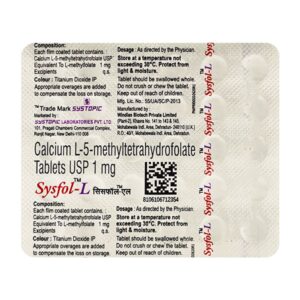FOLIC ACID
FOLIC ACID: Folic acid is a synthetic form of folate, which is a B-vitamin necessary for the production and maintenance of new cells in the body. It is primarily prescribed to treat or prevent folic acid deficiency anemia, as well as to supplement the diet during pregnancy.
The mechanism of action of folic acid involves its conversion to its active form, tetrahydrofolic acid, in the body. Tetrahydrofolic acid is essential for the synthesis of DNA, RNA, and proteins. It plays a crucial role in cell division and growth, making it important for the production of red blood cells and proper fetal development during pregnancy.
The dosage of folic acid varies based on the specific condition being treated. For the prevention of folic acid deficiency, a typical dosage is 400 micrograms (mcg) per day for adults. Pregnant women require a higher dose of 600 to 800 mcg daily to ensure adequate folic acid levels for fetal development. The dosage may be adjusted by a healthcare professional based on individual needs.
Folic acid is generally considered safe and well-tolerated when taken according to the recommended dosage. However, some individuals may experience mild side effects such as nausea, bloating, gas, and a bitter or unpleasant taste in the mouth. These side effects are usually temporary and resolve on their own.
Rarely, high doses of folic acid can mask the symptoms of vitamin B12 deficiency, which, if left untreated, can lead to nerve damage. People with a history of vitamin B12 deficiency or at risk for it should be cautious when taking folic acid supplements, as they may require additional B12 supplementation.
In summary, folic acid is a synthetic form of folate used to treat or prevent folic acid deficiency anemia and supplement the diet during pregnancy. Its mechanism of action involves its conversion to its active form, which is vital for DNA, RNA, and protein synthesis. Common side effects are usually mild and temporary. However, caution is needed for individuals with vitamin B12 deficiency. As always, it is essential to consult with a healthcare professional before starting any new medication.






